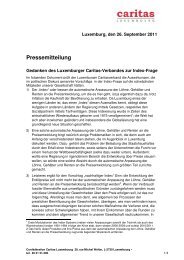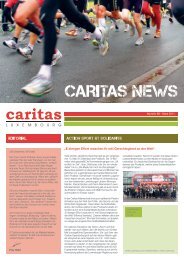Sozialalmanach - Caritas Luxembourg
Sozialalmanach - Caritas Luxembourg
Sozialalmanach - Caritas Luxembourg
Create successful ePaper yourself
Turn your PDF publications into a flip-book with our unique Google optimized e-Paper software.
egulation, economic growth, levels of productivity and employment, and the distribution<br />
of goods, services, incomes, and wealth 4 . As politics defines and qualifies property rights,<br />
it demarcates boundaries between the political and the economic realms of society. For<br />
advanced capitalism, it is imperative that the state allows the market to function relatively<br />
autonomously. Today, that very requirement commits the state to more rather than less<br />
activism, forcing it into expensive and radical measures of crisis management.<br />
In times of crisis, politics and economics are inseparably linked, and the precipitous<br />
return of the state to economic affairs is surely not the result of an emerging widely shared<br />
and unchallenged political consensus. Severe economic turmoil always polarises political<br />
debate and economic analysis. Deep crises easily trigger the overthrow of ruling parties.<br />
The recent government turnovers in Iceland, Latvia, Hungary, and the Czech Republic<br />
are the first political repercussions of the crisis. The 2008 election of Barack Obama as<br />
President of the United States of America can also partially be attributed to the crisis.<br />
Similarly, the significant gains of the far right, populist, anti-EU, nationalist parties in<br />
Denmark, Austria, Hungary, the Netherlands, and the UK in the June 2009 elections for the<br />
European parliament reveal how the crisis and fears of unemployment can fuel xenophobia<br />
and protectionist sentiments. The landslide victories of the centre-left in Japan and Greece<br />
in September 2009 are among the most recent examples of punctuated political change.<br />
Mass unemployment, rising poverty and inequality, cuts in public sector pay and<br />
services, and reduced pensions and social benefits bring enormous pressure to bear on<br />
elected politicians. When bankers, enjoying government support, continue to rallying against<br />
intrusive financial regulation, while continuing to pay out huge bonuses to traders, such<br />
behaviour confronts elected leaders with the daunting political challenge of communicating<br />
these ‘pro-business’ interventions (which arguably do avert further economic distress) to<br />
citizens in the real economy whose jobs, savings, and pensions are at risk. Communicating<br />
and explaining policy measures, as well as finding effective and fair solutions of crisis<br />
management that citizens consider legitimate, is a key political precondition for a sustainable<br />
economic recovery.<br />
The political management of expectations under the prospect of low growth is surely a<br />
tall order. This is perhaps most daunting in mature European welfare states. While those<br />
at the top always used to welcome these developments as win-win situations, large sections<br />
of the middle class feel more and more uncomfortable about the prospect of worldwide<br />
competition, outsourcing the pressures on wages, and, in the case of Western Europe, on<br />
the welfare systems. In this regard, the financial crisis may also be considered a wake-up<br />
call for everyone: the seat of economic vitality is shifting from west to east and everyone<br />
4 Granovetter (1985); Swedberg (1987); Maier (1987).<br />
150








